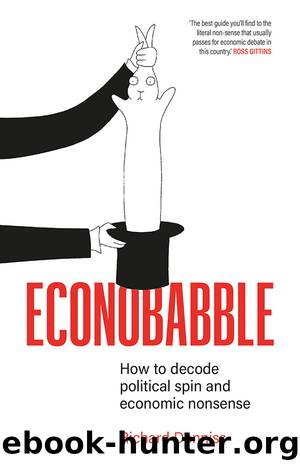Econobabble by Richard Denniss

Author:Richard Denniss [Denniss, Richard]
Language: eng
Format: epub
ISBN: 9781925203806
Publisher: Black Inc.
Published: 0101-01-01T00:00:00+00:00
BUT COSTELLO DELIVERED ELEVEN SURPLUSES IN A ROW!
Most people remember that Peter Costello delivered a string of budget surpluses. But what most people donât remember is that it was Peter Costello who convinced them that the definition of âgood economic managementâ was running a budget surplus. Even fewer people will admit that they have little idea what a budget surplus really means. Econobabble is used to conceal, not reveal.
Anyone who has ever bought a house or a new car has run a âbudget deficitâ. If you earn $100,000 per year and buy a $700,000 house, you will rack up a big deficit that year and, inevitably, a big debt. Is that reckless or irresponsible? Most people, and most financial planners, donât think so. Nor do most companies.
Tony Shepherd, the man who ran the Abbott governmentâs Commission of Audit, and who told the nation it had to live within its means, knows the value of debt better than most. During his time as chairman of Transfield, its debt ballooned from $282 million to $1.606 billion.13
Peter Costello played a simple trick on the Australian people during the Howard years. While economists see budget deficits and budget surpluses as tools to help manage the economy, âProfligate Peteâ redefined the budget outcome as the ultimate objective of economic management. Put simply, he convinced us that surpluses were good and deficits were bad. So if he delivered a surplus, he must have done a good job. Right? Wrong.
Costello squandered a mining boom and convinced millions that heâd saved the country. His enormous and inequitable tax cuts were so poorly timed that they forced the Reserve Bank to push up interest rates, which in turn cost middle-income earners with mortgages a fortune.
The existence of a budget surplus or deficit is not evidence of good or bad economic management. What does matter, however, is that the size of the surplus or deficit is appropriate for the economic conditions of the time, and that the composition of government spending sets the country up for the future. Costello used econobabble to conceal the complexity of the problems he faced, and to justify his simplistic goal to cut taxes for his friends and cut public spending on his foes.
In economic management, as in politics, timing is everything. While government budgets are an annual affair, economies have much longer cycles than the time taken for the earth to get around the sun. All sorts of unexpected shocks â some good, some bad â affect our economy, and whether they cancel each other out or reinforce each other in an arbitrary twelve-month period has far more to do with luck than with economic management. A booming China was great for some parts of the Australian economy in the middle of the 2000s, and the GFC was terrible for other parts of the economy towards the end of that same decade. More recently, COVID-19 has decimated airlines and travel agents and delivered huge windfalls for many online retailers. And of course Chinaâs trade
Download
This site does not store any files on its server. We only index and link to content provided by other sites. Please contact the content providers to delete copyright contents if any and email us, we'll remove relevant links or contents immediately.
International Integration of the Brazilian Economy by Elias C. Grivoyannis(100866)
The Radium Girls by Kate Moore(11987)
Turbulence by E. J. Noyes(7991)
Nudge - Improving Decisions about Health, Wealth, and Happiness by Thaler Sunstein(7669)
The Black Swan by Nassim Nicholas Taleb(7068)
Rich Dad Poor Dad by Robert T. Kiyosaki(6539)
Pioneering Portfolio Management by David F. Swensen(6264)
Man-made Catastrophes and Risk Information Concealment by Dmitry Chernov & Didier Sornette(5962)
Zero to One by Peter Thiel(5743)
Secrecy World by Jake Bernstein(4710)
Millionaire: The Philanderer, Gambler, and Duelist Who Invented Modern Finance by Janet Gleeson(4432)
The Age of Surveillance Capitalism by Shoshana Zuboff(4257)
Skin in the Game by Nassim Nicholas Taleb(4211)
Bullshit Jobs by David Graeber(4150)
The Money Culture by Michael Lewis(4147)
Skin in the Game: Hidden Asymmetries in Daily Life by Nassim Nicholas Taleb(3966)
The Dhandho Investor by Mohnish Pabrai(3731)
The Wisdom of Finance by Mihir Desai(3703)
Blockchain Basics by Daniel Drescher(3545)
